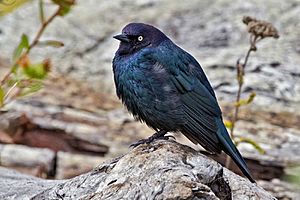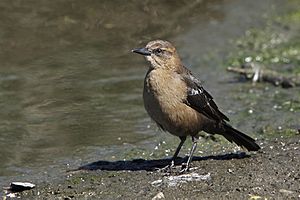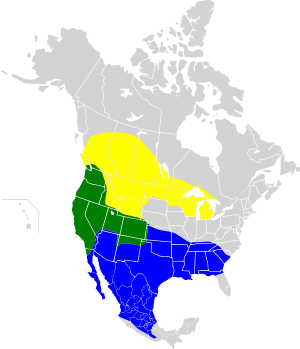Brewer's blackbird facts for kids
Quick facts for kids Brewer's blackbird |
|
|---|---|
 |
|
| male | |
 |
|
| female | |
| Conservation status | |
| Scientific classification | |
| Genus: |
Euphagus
|
| Species: |
cyanocephalus
|
 |
|
| Range of E. cyanocephalus Breeding range Year-round range Wintering range | |
| Synonyms | |
|
Euphagus affinis (Shufeldt, 1892) |
|
Brewer's blackbird (Euphagus cyanocephalus) is a medium-sized New World blackbird. It is named after the ornithologist Thomas Mayo Brewer.
Contents
Description
Adult males have black plumage with an iridescent purple head and neck and glossy bluish-green highlights on the rest of the body. The feet and legs are black and the eye is bright yellow. The female is brownish-grey with slight hints of the male's iridescence. The female's eye is dark brown, while the male's is bright yellow. Overall, they resemble the eastern member of the same genus, the rusty blackbird; the Brewer's blackbird, however, has a shorter bill and the male's head is iridescent purple. This bird is often mistaken for the common grackle but has a shorter tail. The call is a sharp check which is also distinguishable. This bird is in a different family from the Eurasian blackbird.
| Standard Measurements | |
|---|---|
| length | 8–10.3 in (200–260 mm) |
| weight | 63 g (2.2 oz) |
| wingspan | 15.5 in (390 mm) |
| wing | 121–133 mm (4.8–5.2 in) |
| tail | 95–102.5 mm (3.74–4.04 in) |
| culmen | 20.4–24 mm (0.80–0.94 in) |
| tarsus | 29.5–33.5 mm (1.16–1.32 in) |
Habitat
Their breeding habitat is open and semi-open areas, often near water, across central and western North America. The cup nest can be located in various locations: in a tree, in tall grass or on a cliff. They often nest in colonies. They are also very common in parking lots, and easily acclimate to the presence of people.
These birds are often permanent residents in the west. Other birds migrate to the southeastern United States and Mexico. The range of this bird has been expanding east in the Great Lakes region.
Feeding
They forage in shallow water or in fields, mainly eating seeds and insects, some berries. They sometimes catch insects in flight. They feed in flocks outside of the breeding season, sometimes with other blackbirds.
Protected Status
The Brewer's blackbird (Euphagus cyanocephalus) is protected in the USA under the Migratory Bird Treaty Act of 1918, however exceptions are granted under 50 CFR part 21 (2014) for animals committing or about to commit depredations upon ornamental or shade trees, agricultural crops, livestock, or wildlife, or when concentrated in such numbers and manner that they are a health hazard or other nuisance.
Gallery
- BirdLife species factsheet for Euphagus cyanocephalus
- Audio recordings of Brewer's blackbird on Xeno-canto.
See also
 In Spanish: Turpial ojiclaro para niños
In Spanish: Turpial ojiclaro para niños








